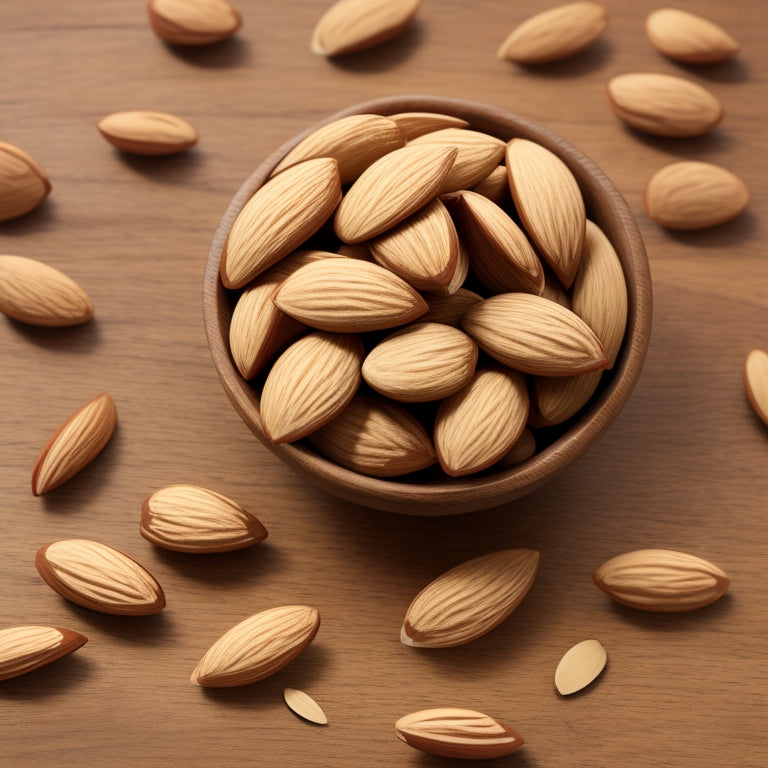Almonds contain vitamins, minerals, protein, and fiber, so they can provide many health benefits. Just a small amount of almonds (about 1 ounce) contains one-eighth of a person's daily protein needs.
Benefits of almonds
1) Almonds and cholesterol
Almonds are rich in fat, but it is unsaturated fat. This type of fat does not increase the risk of low-density lipoprotein (LDL), or "bad" cholesterol. The American Heart Association (AHA) modestly states that unsaturated fats may improve a person's blood cholesterol profile. Additionally, almonds contain no cholesterol.
A 2005 study showed that eating almonds can:
- Increase vitamin E levels in plasma and red blood cells
- Reduce overall cholesterol levels
These researchers believe that vitamin E is an antioxidant that can help stop the oxidation process that causes cholesterol to clog arteries.
Further research found similar results. The authors of a 2018 review noted that nutrients in almonds may help increase or maintain levels of high-density lipoprotein (HDL), or "good" cholesterol. They recommend people consume about 45 grams (grams) of almonds daily to protect heart health.
2) Almonds and cancer risk
A 2015 study looked at nut consumption and cancer risk.
Research has found that people who eat peanuts, walnuts and almonds have a two to three times lower risk of breast cancer compared to those who do not eat peanuts, walnuts and almonds. They concluded: "Peanuts, walnuts and almonds appear to be protective factors in the development of breast cancer.
3) Almonds and heart disease
Almonds and other nuts and seeds can help improve lipids, or fat, levels in the blood. This can benefit heart health. In a 2014 study, scientists found that almonds significantly increased the amount of antioxidants in the blood, lowered blood pressure and improved blood flow. Participants, all healthy men aged 20-70, took 50 grams of almonds daily for 4 weeks. Researchers believe this may be due to:- Vitamin E, healthy fats and fiber, can help a person feel full
- Antioxidant effects of flavonoids
4) Almonds and vitamin E
The content of vitamin E in almonds is relatively high. Vitamin E contains antioxidants such as tocopherol. One ounce (28.4 grams) of regular almonds provides 7.27 milligrams (mg) of vitamin E, about a person's daily requirement.
Vitamin E and other antioxidants help prevent oxidative damage to the body. This damage occurs when too many free radicals (free radicals) accumulate. Free radicals come from natural body processes and environmental stressors. The body can eliminate many of these substances, but dietary antioxidants can also help eliminate them. High levels of free radicals can cause oxidative stress, leading to cell damage. This can lead to various illnesses and health problems.
A 2016 review suggested that an antioxidant in vitamin E, alpha-tocopherol, may play a role in reducing cancer risk. However, as the findings are generally contradictory, more research is needed to confirm this.
5) Almonds and blood sugar
There is evidence that almonds can help control blood sugar levels. Many people with type 2 diabetes have low levels of magnesium. Vitamin deficiencies are common among people who have difficulty controlling their blood sugar levels. Scientists suggest there may be a link between magnesium deficiency and insulin resistance. In a 2011 study, 20 people with type 2 diabetes ate 60 grams of almonds daily for 12 weeks. Overall, they saw improvements in:- Blood sugar level
- Blood or fat levels
One ounce of almonds provides 76.5 milligrams of magnesium, which is 18 to 24 percent of an adult's daily requirement.
Some experts recommend using magnesium supplements to improve blood sugar conditions, but almonds may provide a suitable dietary source.
6) Almonds help control weight
Almonds are low in carbohydrates but high in protein, healthy fats, and fiber.According to research that emerged in 2015, eating almonds as a morning snack can make a person feel full for a period of time. People consumed either 28 grams (173 calories) or 42 grams (259 calories). The extent to which participants lost their appetite depended on the number of almonds they consumed.
Feeding can help people lose weight because they are less likely to seek out more snacks. Breakfast cereals often contain nuts.
7) Almonds promote bone health
Almonds contain calcium, magnesium, manganese, copper, vitamin K, protein and zinc, all of which contribute to bone health.
Experts recommend almonds as a way to get some of these nutrients.
Nutrition
The table below shows the amount of each nutrient in one ounce (28.4 grams) of almonds. This roughly equals about 23 almonds. It also shows the amount of each nutrient that adults need, according to the 2015-2020 Dietary Guidelines for Americans. Recommendations will vary based on the individual's gender and age.

B vitamins, choline, and protein may be lacking in plant-based diets. People following a vegan diet can supplement their needs by eating almonds.
Risk
Health experts may discuss potential risks associated with eating almonds.
Allergies
People with nut allergies should avoid almonds. If a person experiences hives, swelling, and difficulty breathing after eating almonds, they should seek medical help immediately. A condition known as anaphylaxis can progress rapidly and can be life-threatening.
People with allergies should check the packaging of prepared foods and make sure restaurant dishes are nut-free. Cakes, candies, salty rice, and many other foods and dishes may contain nuts.
Choke and suffocate
Young children, some older adults, and anyone with difficulty swallowing should avoid eating whole nuts, which may cause choking.
People with dementia, Parkinson's disease and limited mobility may be at higher risk of aspiration, which can cause food to enter the lungs. Inhaling food can lead to complications such as pneumonia.
Conclusion

Almonds are a healthy food. They provide a range of essential nutrients and can be a good source of protein for people following a plant-based diet. They also have a variety of uses, and people can incorporate them into their diet in a variety of ways.
People with nut allergies should not eat almonds or almond products.














